30+ Wheat-Free Breakfast Ideas to Kickstart Your Day
Mornings can be tough, especially when you’re trying to avoid wheat. But who says breakfast has to be boring?
I’ve got a treasure trove of delicious, wheat-free breakfast ideas that’ll make you jump out of bed with excitement.
From savory egg dishes to sweet fruit treats, there’s something here for every taste bud.
Let’s dive into a world of flavors that’ll revolutionize your morning routine and keep you energized all day long!
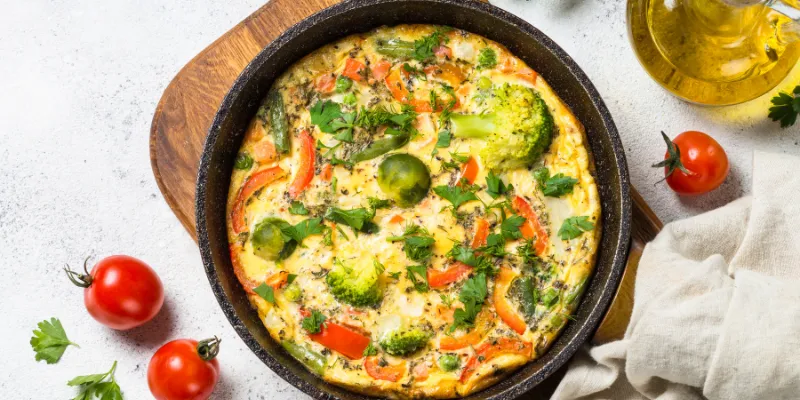

Egg-based Delights
Vegetable Omelette
Start your day with a protein-packed punch! A vegetable omelette is not just tasty, it’s a nutritional powerhouse.
You can customize it with your favorite veggies – think colorful bell peppers, spinach, and mushrooms.
The eggs provide a perfect protein boost, while the veggies add essential vitamins and fiber.
Nutrition info: A typical vegetable omelette (2 eggs) contains about 200 calories, 14g protein, 15g fat, and 4g carbohydrates.
Shakshuka
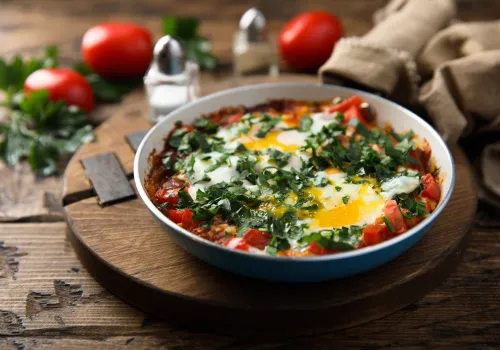
Originating from North Africa, shakshuka is a flavor explosion in your mouth. Eggs poached in a sauce of tomatoes, peppers, and onions, often spiced with cumin and paprika.
This dish is not only wheat-free but also packed with lycopene from tomatoes, which is great for heart health. It’s a hearty breakfast that’ll keep you full until lunch.
Nutrition info: A serving of shakshuka (1 egg) provides approximately 140 calories, 7g protein, 10g fat, and 6g carbohydrates.
Frittata
Think of a frittata as an Italian open-faced omelette. It’s a versatile dish that you can fill with any vegetables, cheeses, or meats you like.
Frittatas are great for meal prep – make a big one on Sunday, and you’ve got breakfast sorted for half the week!
They’re rich in protein and can be a good source of vegetables too.
Nutrition info: A slice of vegetable frittata typically contains about 180 calories, 12g protein, 13g fat, and 5g carbohydrates.
Egg and Vegetable Scramble
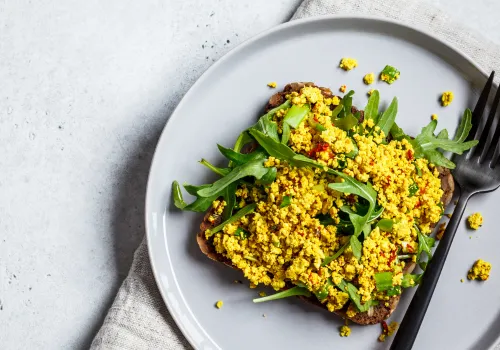
When you’re short on time but still want a nutritious breakfast, an egg and vegetable scramble is your best friend.
It’s quick, easy, and infinitely customizable.
Throw in some spinach for iron, tomatoes for vitamin C, and maybe some feta cheese for extra flavor.
It’s a balanced meal that’ll give you steady energy throughout the morning.
Nutrition info: A serving of egg and vegetable scramble (2 eggs) provides roughly 220 calories, 16g protein, 16g fat, and 6g carbohydrates.
Baked Eggs in Avocado
This Instagram-worthy breakfast is as nutritious as it is photogenic. Eggs baked right in avocado halves create a perfect marriage of protein and healthy fats.
Avocados are rich in monounsaturated fats, which are great for heart health.
Add a sprinkle of cheese and some herbs for extra flavor, and you’ve got a gourmet breakfast in minutes.
Nutrition info: One baked egg in avocado half contains approximately 260 calories, 11g protein, 22g fat, and 7g carbohydrates.
Grain-based (using wheat-free grains)
Quinoa Porridge
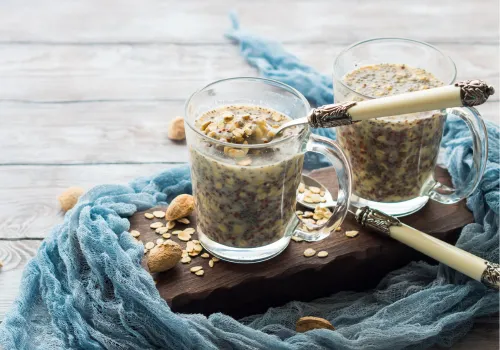
Quinoa isn’t just for savory dishes – it makes a delicious, nutty porridge too!
This protein-rich grain (actually a seed) is a complete protein, containing all nine essential amino acids.
Cook it in milk or a plant-based alternative, add some cinnamon and honey, and top with fresh fruits for a breakfast that’s both comforting and energizing.
Nutrition info: A serving of quinoa porridge (1/2 cup cooked quinoa) contains about 180 calories, 6g protein, 3g fat, and 30g carbohydrates.
Buckwheat Pancakes
Despite its name, buckwheat isn’t related to wheat at all. It’s actually a seed that’s related to rhubarb!
Buckwheat pancakes have a unique, slightly nutty flavor and are packed with nutrients.
They’re rich in rutin, a flavonoid that may improve circulation and prevent blood clots.
Top these pancakes with fresh berries and a drizzle of maple syrup for a delightful breakfast.
Nutrition info: Two 4-inch buckwheat pancakes provide approximately 160 calories, 5g protein, 4g fat, and 27g carbohydrates.
Rice Pudding
Who says you can’t have dessert for breakfast? Rice pudding is a comforting, creamy treat that’s easily made wheat-free. Use brown rice for extra fiber and nutrients.
Flavor it with vanilla and cinnamon, and top with fresh fruits for added vitamins. It’s a sweet start to your day that won’t leave you with a sugar crash.
Nutrition info: A 1/2 cup serving of rice pudding contains about 150 calories, 3g protein, 2g fat, and 30g carbohydrates.
Millet Breakfast Bowl
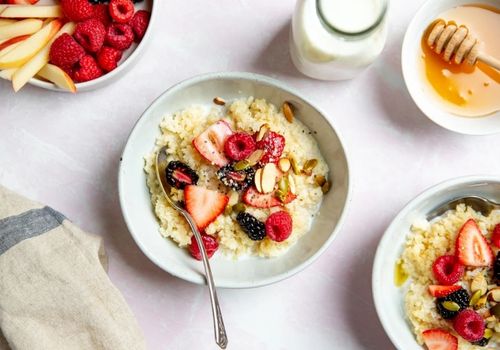
Millet is a small, gluten-free grain that’s packed with nutrients. It’s especially high in magnesium, which is important for bone health and regulating blood sugar.
Cook it like oatmeal and top with nuts, seeds, and fruits for a breakfast bowl that’s both nutritious and delicious.
It has a mild, slightly sweet flavor that pairs well with many toppings.
Nutrition info: A 1/2 cup serving of cooked millet provides roughly 140 calories, 4g protein, 1g fat, and 27g carbohydrates.
Cornmeal Polenta with Berries
Polenta isn’t just for dinner – it makes a fantastic breakfast too!
This creamy cornmeal porridge is naturally gluten-free and can be made sweet or savory.
For a breakfast version, cook it with milk, sweeten with a touch of honey, and top with a variety of berries.
The antioxidants in berries pair wonderfully with the comforting warmth of polenta.
Nutrition info: A 1/2 cup serving of polenta with berries contains approximately 170 calories, 4g protein, 2g fat, and 35g carbohydrates.
Dairy and Alternatives
Greek Yogurt Parfait
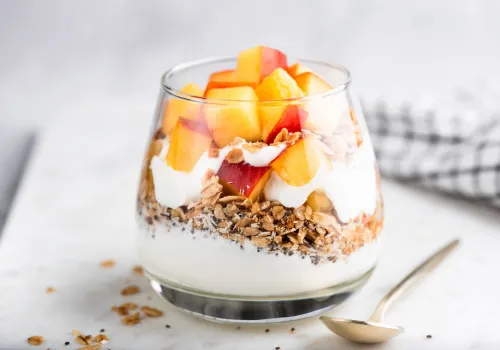
Greek yogurt is a protein powerhouse, containing almost double the protein of regular yogurt.
Layer it with fresh fruits and a sprinkle of nuts or seeds for a parfait that’s as pretty as it is nutritious.
The protein and fat in the yogurt will keep you full, while the fruits provide vitamins and the nuts add healthy fats and a satisfying crunch.
Nutrition info: A Greek yogurt parfait (6 oz yogurt) typically contains about 200 calories, 20g protein, 8g fat, and 15g carbohydrates.
Cottage Cheese with Fruit
Cottage cheese is another great high-protein option.
It’s low in calories but high in nutrients like calcium and B vitamins. Its mild flavor pairs well with both sweet and savory toppings.
Try it with fresh peaches or pineapple for a sweet treat, or with cherry tomatoes and a sprinkle of herbs for a savory twist.
It’s a versatile breakfast that you can adapt to your mood.
Nutrition info: 1/2 cup of cottage cheese with fruit provides approximately 140 calories, 13g protein, 3g fat, and 15g carbohydrates.
Chia Seed Pudding
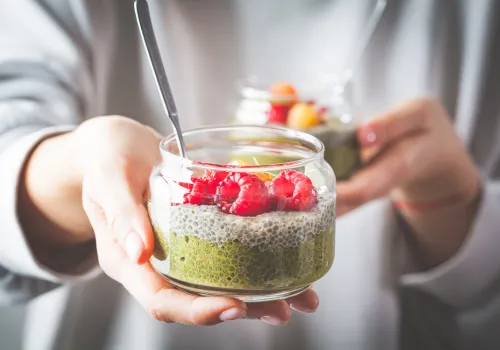
Chia seeds are tiny nutritional giants.
When soaked in liquid, they form a gel-like consistency, creating a pudding-like texture.
They’re packed with fiber, protein, and omega-3 fatty acids.
Mix them with your favorite milk (dairy or plant-based), add some vanilla and honey, and let them sit overnight.
In the morning, top with fresh fruits for a no-fuss, nutrient-dense breakfast.
Nutrition info: A 1/2 cup serving of chia seed pudding contains about 180 calories, 6g protein, 12g fat, and 15g carbohydrates.
Smoothie Bowl
Smoothie bowls are like smoothies you can eat with a spoon.
They’re thicker than regular smoothies and topped with various goodies for added texture and nutrition.
Blend your favorite fruits with Greek yogurt or plant-based milk, pour into a bowl, and top with sliced fruits, nuts, and seeds.
It’s a refreshing and nutritious way to start your day, especially in warmer months.
Nutrition info: A typical smoothie bowl provides around 300 calories, 10g protein, 5g fat, and 55g carbohydrates.
Kefir Drink

Kefir is a fermented milk drink that’s packed with probiotics, which are great for gut health.
It has a tangy, slightly fizzy taste and a consistency similar to thin yogurt.
You can drink it plain, blend it into smoothies, or use it as a base for overnight oats.
It’s particularly high in protein and calcium, making it a nutritious breakfast option.
Nutrition info: A 1 cup serving of plain kefir contains about 100 calories, 10g protein, 2g fat, and 12g carbohydrates.
Protein-rich Options
Turkey Sausage with Vegetables
Start your day with a savory punch! Turkey sausage is a leaner alternative to traditional breakfast sausages, providing plenty of protein without excess saturated fat.
Pair it with sautéed vegetables like bell peppers and onions for added nutrients and fiber.
This balanced combination of protein and vegetables will keep you satisfied until lunchtime.
Nutrition info: A serving of turkey sausage (2 links) with vegetables provides approximately 200 calories, 14g protein, 16g fat, and 6g carbohydrates.
Smoked Salmon and Cream Cheese Roll-ups

For a fancy yet easy breakfast, try smoked salmon and cream cheese roll-ups. Smoked salmon is rich in omega-3 fatty acids, which are great for brain and heart health.
Spread some cream cheese on the salmon, add some cucumber or avocado for crunch and extra nutrients, then roll it up.
It’s a delicious, no-cook breakfast that feels indulgent but is actually quite nutritious.
Nutrition info: Two salmon and cream cheese roll-ups contain about 180 calories, 13g protein, 14g fat, and 2g carbohydrates.
Tofu Scramble
A vegan alternative to scrambled eggs, tofu scramble is high in protein and can be flavored in countless ways.
Crumble firm tofu and cook it with your favorite vegetables and spices.
Turmeric gives it a yellow color similar to eggs, while also providing anti-inflammatory benefits.
Nutritional yeast can add a cheesy flavor and boost the B-vitamin content.
Nutrition info: A serving of tofu scramble (1/2 cup) provides roughly 140 calories, 14g protein, 7g fat, and 6g carbohydrates.
Beef Breakfast Patties
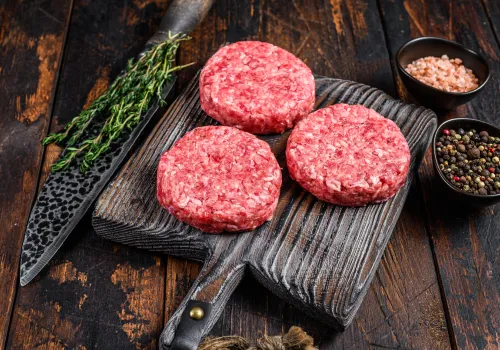
Homemade beef breakfast patties can be a nutritious start to your day.
Choose lean ground beef and mix in some finely chopped vegetables like onions and bell peppers for added nutrients.
These patties are high in protein and iron, which can help maintain energy levels throughout the morning.
Pair them with some avocado or a side of fruit for a balanced meal.
Nutrition info: One 3 oz beef breakfast patty contains approximately 180 calories, 22g protein, 10g fat, and 0g carbohydrates.
Lamb Kofta
For a Middle Eastern-inspired breakfast, try lamb kofta.
These spiced meat patties are flavorful and protein-rich. Mix ground lamb with herbs and spices like mint, cumin, and coriander.
Lamb is a good source of zinc and vitamin B12. Serve the kofta with a side of cucumber yogurt sauce (tzatziki) and some fresh vegetables for a complete meal.
Nutrition info: Two small lamb kofta (about 3 oz) provide roughly 220 calories, 18g protein, 17g fat, and 1g carbohydrates.
Vegetable-based Creations
Sweet Potato Hash
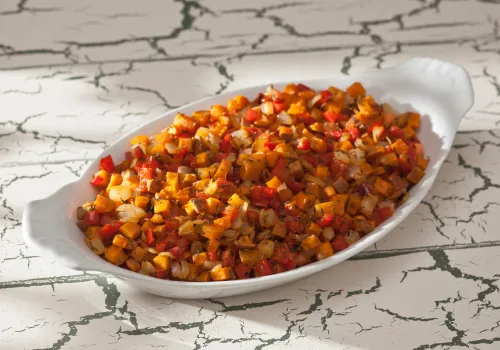
Sweet potatoes aren’t just for dinner – they make a fantastic breakfast too!
Dice them up, sauté with some onions and bell peppers, and you’ve got a colorful, nutritious hash.
Sweet potatoes are rich in beta-carotene, which your body converts to vitamin A.
This nutrient is essential for eye health and immune function.
Top your hash with a fried egg for extra protein.
Nutrition info: A serving of sweet potato hash (1 cup) contains about 150 calories, 3g protein, 5g fat, and 25g carbohydrates.
Zucchini Fritters
Zucchini fritters are a great way to sneak more vegetables into your breakfast.
Grate zucchini, mix with a bit of gluten-free flour, eggs, and seasonings, then pan-fry for a crispy treat.
Zucchini is low in calories but high in vitamin C and potassium.
Serve your fritters with a dollop of Greek yogurt for added protein and a tangy contrast.
Nutrition info: Two small zucchini fritters provide approximately 120 calories, 5g protein, 7g fat, and 10g carbohydrates.
Stuffed Bell Peppers
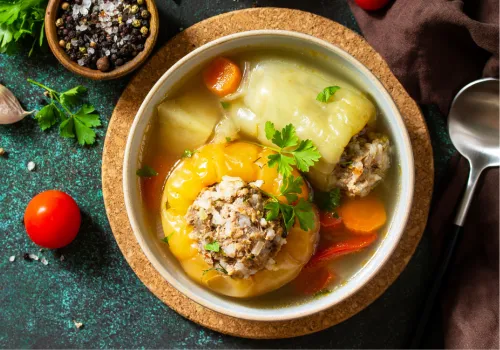
Stuffed bell peppers make for a hearty, veggie-packed breakfast.
Cut bell peppers in half, remove the seeds, and fill with a mixture of scrambled eggs, cheese, and your favorite vegetables.
Bell peppers are extremely high in vitamin C – in fact, they contain more vitamin C than oranges! This breakfast is colorful, nutritious, and sure to keep you full until lunch.
Nutrition info: One stuffed bell pepper half contains roughly 180 calories, 12g protein, 12g fat, and 8g carbohydrates.
Vegetable Juice
For a quick, nutrient-dense breakfast on the go, try making your own vegetable juice.
Blend or juice a variety of vegetables like carrots, celery, cucumber, and leafy greens.
This is a great way to get a concentrated dose of vitamins and minerals first thing in the morning.
Add a piece of fruit like an apple for natural sweetness, and consider including some ginger for a spicy kick and potential digestive benefits.
Nutrition info: A cup of homemade vegetable juice typically contains about 70 calories, 2g protein, 0g fat, and 16g carbohydrates.
Sautéed Mushrooms on Gluten-free Toast
Mushrooms are a great meat alternative, providing a savory, umami flavor and a meaty texture.
Sauté them with some garlic and herbs, then serve on top of your favorite gluten-free toast.
Mushrooms are one of the few non-animal sources of vitamin D, especially if they’ve been exposed to UV light.
They’re also rich in B vitamins and selenium. This breakfast is simple but satisfying.
Nutrition info: A serving of sautéed mushrooms on gluten-free toast provides approximately 180 calories, 5g protein, 8g fat, and 25g carbohydrates.
Fruit-based Favorites
Fruit Salad
Sometimes, the simplest breakfasts are the best. A colorful fruit salad is not only visually appealing but also packed with vitamins, minerals, and fiber.
Mix a variety of fruits for different nutrients – berries for antioxidants, citrus for vitamin C, and bananas for potassium.
Add a sprinkle of chia seeds or chopped nuts for some healthy fats and protein to make it more filling.
Nutrition info: A cup of mixed fruit salad contains about 100 calories, 1g protein, 0g fat, and 25g carbohydrates.
Apple and Almond Butter
For a quick and easy breakfast that’s both nutritious and satisfying, try pairing sliced apples with almond butter.
Apples are rich in fiber and antioxidants, while almond butter provides healthy fats and protein.
This combination of carbs, fats, and protein will help keep your blood sugar stable and provide sustained energy.
It’s a perfect breakfast for busy mornings or as a pre-workout snack.
Nutrition info: An apple with 2 tablespoons of almond butter provides roughly 270 calories, 7g protein, 18g fat, and 28g carbohydrates.
Berry Compote
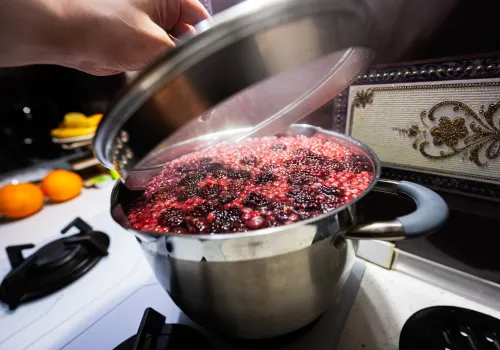
A homemade berry compote is a delicious way to enjoy the benefits of berries, which are packed with antioxidants and vitamin C.
Simply simmer your favorite berries with a touch of honey or maple syrup until they break down into a sauce.
This compote can be used as a topping for yogurt, oatmeal, or gluten-free toast. It’s a great way to enjoy berries year-round, as you can use frozen berries when fresh ones aren’t in season.
Nutrition info: A 1/4 cup serving of berry compote contains approximately 60 calories, 0g protein, 0g fat, and 15g carbohydrates.
Melon Balls
Melon balls are a refreshing and hydrating breakfast option, especially on warm mornings.
Use a melon baller to scoop out balls from cantaloupe, honeydew, and watermelon for a colorful mix.
Melons are low in calories but high in vitamins A and C. They’re also incredibly hydrating, which can help you start your day on the right foot. Add a sprinkle of mint leaves for extra freshness.
Nutrition info: A cup of mixed melon balls provides about 60 calories, 1g protein, 0g fat, and 14g carbohydrates.
Banana “Nice Cream”
Who says you can’t have ice cream for breakfast?
Banana “nice cream” is a healthier alternative made by blending frozen bananas until they reach a creamy, ice cream-like consistency.
Bananas are rich in potassium and vitamin B6, and they provide natural sweetness without added sugars.
You can add other fruits, cocoa powder, or a spoonful of nut butter for variety.
Nutrition info: A serving of banana nice cream (about 1 banana) contains roughly 105 calories, 1g protein, 0g fat, and 27g carbohydrates.
Other Creative Options
Homemade Granola (Oat-based)
Store-bought granola can be high in sugar and often contains wheat. Making your own allows you to control the ingredients and create a truly wheat-free version.
Mix oats (certified gluten-free if you’re sensitive) with nuts, seeds, and a little honey or maple syrup, then bake until golden.
Oats are rich in beta-glucan, a type of fiber that may help lower cholesterol. Enjoy your granola with milk or yogurt and fresh fruit.
Nutrition info: A 1/4 cup serving of homemade granola typically provides about 140 calories, 4g protein, 7g fat, and 17g carbohydrates.
Breakfast Burrito Bowl (Using Rice Instead of Tortilla)
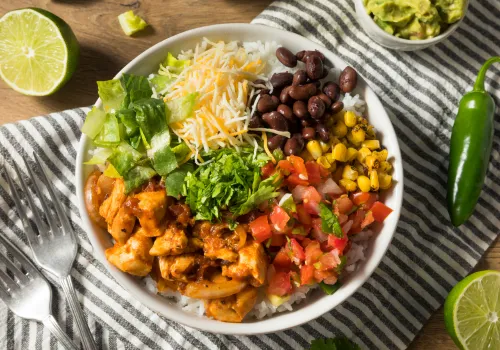
For a hearty, savory breakfast, try a breakfast burrito bowl. Start with a base of brown rice, which is rich in fiber and minerals.
Top it with scrambled eggs, black beans, avocado, salsa, and a sprinkle of cheese.
This bowl is packed with protein, fiber, and healthy fats, which will keep you feeling full and energized.
The combination of rice and beans provides a complete protein, making this a great option for vegetarians.
Nutrition info: A breakfast burrito bowl contains approximately 400 calories, 18g protein, 15g fat, and 50g carbohydrates.
Overnight Oats with Nuts and Seeds
Overnight oats are a time-saving breakfast option that you prepare the night before.
Mix oats (use certified gluten-free if needed) with milk or a plant-based alternative, then add your favorite nuts and seeds.
Chia seeds, flaxseeds, or pumpkin seeds are great additions, providing omega-3 fatty acids and various minerals. In the morning, top with fresh fruit and a drizzle of honey if desired.
Nutrition info: A serving of overnight oats (1/2 cup dry oats) with nuts and seeds provides about 300 calories, 12g protein, 14g fat, and 35g carbohydrates.
Final Thoughts
Embracing a wheat-free lifestyle doesn’t mean sacrificing flavor or variety at breakfast time.
These 30+ ideas are just the beginning – feel free to mix and match, and don’t be afraid to get creative in the kitchen!
Remember, a balanced breakfast should include protein, healthy fats, and complex carbohydrates to keep you energized throughout the morning.
Experiment with different combinations to find what works best for you.
With these delicious options, you might find yourself looking forward to breakfast more than ever before.
Here’s to starting your days right with nutritious, wheat-free meals!